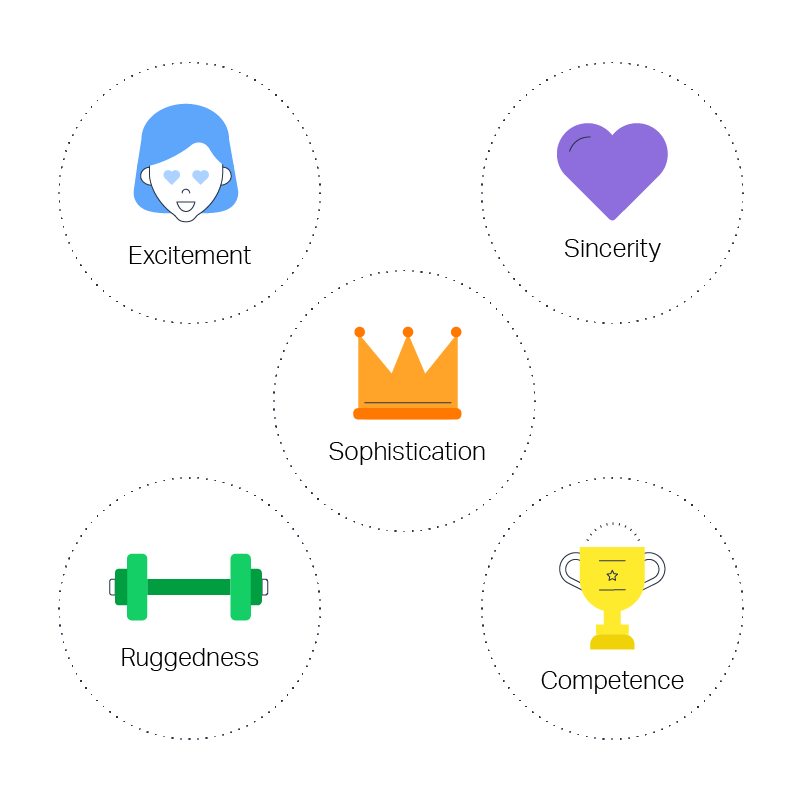Let’s Get Personal – The highs and lows of brand personality
Customers’ decision to purchase from a brand is made on a deep, personal level. They are investing their hard-earned money and time into your brand, and they want to know that your brand took the time to reciprocate. Once you understand that, then it’s important to also understand why your brand personality is an essential piece to achieving goals and gaining customers that turn into your brand advocates.
According to Investopedia, the term ‘brand personality is defined as a set of human characteristics that are attributed to a brand name. Groundbreaking, right?
Why is it important to have a brand personality?
A brand personality sets the tone for the emotion you want to evoke from your customer. For example, luxury goods brands have a sophisticated personality, typically accompanied by a sleek look and feel. However, for an outdoor activity brand, a sophisticated voice probably wouldn’t elicit the ideal feelings from their target audience. It’s all about considering who your customers are and how they might perceive your brand. Stay consistent with the goal of your organization and a well-crafted and targeted brand personality will follow.
A brand personality can take many tones. However, across the board, these are the most common ones you’re likely to see. These five tones were first developed and researched by Jennifer Aaker in 1997 when she wrote “Dimensions of Brand Personality”. Since then, brands have been using these dimensions to base their brand tone.

Let’s Dig a Little Deeper…
Excitement:
A brand that encompasses excitement as its brand tone is likely to elicit playful emotions. It’s focused on delivering products, services, or experiences that are imaginative, spirited, and modern. A brand that embodies the excitement personality is Disney World. Disney does a great job of keeping its brand personality consistent throughout all customer interactions whether it’s visiting amusement parks, watching Disney Channel, or buying Disney character plush toys.
Source: wfla.com
Sincerity:
Brands that are sincere aim to gain absolute trust from their customers. They possess thoughtful, wholesome, and empathetic traits. Starbucks embodies brand sincerity through its efforts to provide high-quality coffee and an even higher-quality connection with customers and business partners. Across the board, the Starbucks personality is seamless. No matter what cafe you visit, each experience and coffee quality, is consistent, a telltale sign of a sincere brand personality.
Source: verge.com
Ruggedness:
A brand that is rugged offers products that are built-to-last, outdoorsy, and strong. Rugged brands are bold and adventurous. A good example of a rugged brand is Patagonia. Patagonia was founded by outdoor-loving people, for outdoor-loving people. They understand that their customers want a product that is build-to-last in all conditions, so that’s what they give them.
Source: moneyinc.com
Competence:
A competent brand is reliable, intelligent, and successful. It’s often backed by research, technology, and endorsements from thought leaders, and has typically been in the game for a while. Microsoft perfectly embodies a competent brand personality. Microsoft is a thought leader in the industry and delivers high-quality products that customers trust and continue to purchase. When’s the last time you doubted Microsoft? Exactly.
Source: avepoint.com
Sophistication:
A sophisticated brand is elegant, refined, and prestigious. This is the hardest brand personality to achieve because, as you can imagine, building a sophisticated brand takes time. Brands with this personality are almost always luxury goods but they can fall within many other industries such as fashion, food, and beverage, automobile, and jewelry among others. Gucci, backed by decades of success, provides high-quality merchandise and perfectly exemplifies a sophisticated tone.
Source: brittonmdg.com
When choosing a brand personality that fits with your organization, be honest with yourself. A customer will be able to tell if you are not accurately embodying the personality you claim to have. While it’s a good rule of thumb to stick to one brand personality, don’t let that limit you. For example, if you are an “excitement” brand, don’t shy away from backing your claims with sincere remarks.
Contact Pyxl
Not sure if your brand has a well-defined personality? At Pxyl, we’ve worked with brands across the personality spectrum. Needless to say, we’re experienced in this department. Let us help your brand, contact the Pyxl team today!
Updated: Nov 15, 2024
 Kati Terzinski
Kati Terzinski Erin Murray
Erin Murray